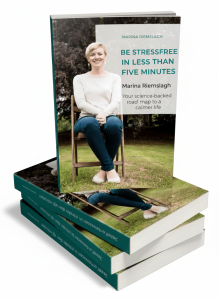The subconscious
Our mind consists of several layers. When we are in our daily routine, we operate a lot on autopilot: we get up, stumble to the bathroom without thinking, then scurry toward the kitchen for breakfast, mindlessly turn on our phone, walk to the front door for the newspaper while talking to our loved one, and make a shopping list while eating our breakfast.
Are we all doing this consciously? No, and fortunately so. Thank God we have a mode in which we do things automatically, otherwise we would have to think about every action and everything we do takes a lot of attention and energy.
Doing two things at once, acting thoughtlessly, not thinking about what you are doing, on autopilot: it all means we are functioning from the subconscious mind, and that is a lightning-fast "driver" that saves us a lot of energy.
Besides all the enormous benefits of functioning from the subconscious, there is also quite a "but" to this method of control. After all, the fact that you do things automatically only has advantages if the way your automatic actions are programmed is also fruitful.
And "dependent" is a key word in this because the dependence, which we all experienced the first 7 years of our lives, very quickly makes us have an experience of loss of control and that is unsafe for us as human beings. Then our safety system is activated.
Need for security
When we have experienced many unsafe situations in childhood, part of our automatic programming is concerned with preventing danger. How much danger depends entirely on the first 7 years of our lives.
Safety comes above all else. Safety comes before growth. This is why change can feel so difficult, because that which is known is always safer than the unknown. Even when it hurts or is annoying.
So to really change, you must be willing to be a little uncomfortable.
Deliberately choose the desired programming
The conscious mind is that part of you that is able to choose freely. To begin with, that choosing involves not going along with what the unwanted programming "makes" you do.
As summary as this sounds as "free will," this is the opening to give your free will more space.
Let me make it concrete. Suppose you want to stop smoking. Every time you almost naturally want to light up a cigarette, the only option you have is to notice it and not do it. The impulse may be totally there, but you can stop yourself from following it.
Then you can choose, consciously, to throw away your cigarettes. That makes the next impulse a whole lot more complicated to follow and thus much easier to stop.
Then you can decide, as a conscious choice, to reward yourself at the end of the day when you haven't smoked. Even more input that broadens free will.
Unfortunately, stopping your impulse in this way takes a lot of energy. Your conscious relates to your subconscious, where the impulses come from, like a mouse to an elephant.
Collaboration
For both parts of yourself (your consciousness and your subconscious), it is absolutely optimal when these 2 parts begin to work together, using the qualities of both to their best advantage.
Use your conscious mind to notice and choose and program the desired. Use your subconscious mind to automatically carry out the chosen programming. That which is not yet programmed to your own desires the subconscious mind shows you automatically by going into alarm.
In this way, you can put yourself completely at the helm of your life.
To learn to reprogram your subconscious independently, it is very helpful to know what the language of the subconscious is and how to access it. You have to become a very smart mouse who knows how to control the elephant because it knows what signals the elephant is responding to.
Can I just want what I want?
Learning to program ourselves to shape our lives the way we want to experience them creates a tremendous experience of freedom.
Freedom always goes hand in hand with responsibility. To avoid appropriating freedoms that may be harmful to others, working in the subconscious with Live The Connection has a safety built into it....
In everything you do, you always consider whether it is "in our highest good," meaning: is this good for all life, including myself?
This may seem contrary to the idea of "free will," but that is pretense. You can trust that if something can be harmful to others, you have not yet got hold of your real, true desire, because your true deep-within-dwelling desire will never be harmful to others. I'm sure you can really trust that completely.
Ovy van Geloven, working with LTC processes since April 2019.
